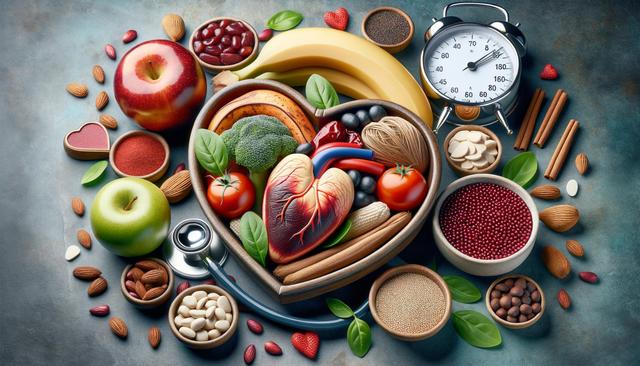Nutrition Tips That May Support Healthy Blood Pressure
To support healthy blood pressure, focus on whole foods, reduce sodium, and include potassium-rich items like bananas and leafy greens. Limiting alcohol, staying hydrated, and maintaining a balanced lifestyle with regular exercise also play a key role in cardiovascular health management.

Understanding the Role of Sodium and Potassium
When it comes to managing blood pressure through nutrition, sodium and potassium are two essential minerals that deserve close attention. High sodium intake has been linked to elevated blood pressure levels, primarily because it can cause the body to retain excess water, increasing the volume of blood and putting added stress on blood vessels. Reducing sodium does not mean eliminating salt entirely, but it does involve being mindful of hidden sources in processed and packaged foods. Opting for fresh, whole foods is a practical way to keep sodium levels in check.
In contrast, potassium helps counterbalance sodium’s effects in the body. It supports the relaxation of blood vessel walls and promotes the excretion of sodium through urine. Foods that are naturally rich in potassium include:
- Bananas
- Sweet potatoes
- Spinach
- Avocados
- Beans and lentils
Incorporating these into daily meals can help support a more balanced blood pressure profile. However, individuals with kidney conditions should consult a healthcare professional before significantly changing their potassium intake.
Whole Grains and Fiber for Cardiovascular Support
Whole grains are a valuable part of a balanced diet that supports healthy blood pressure. Unlike refined grains, whole grains retain their bran and germ, which are rich in fiber, B vitamins, and essential minerals. Dietary fiber, particularly soluble fiber, can contribute to healthier blood pressure by improving cholesterol levels and promoting better blood vessel function.
Examples of nutrient-dense whole grains include:
- Oats
- Brown rice
- Quinoa
- Barley
- Whole wheat bread and pasta
These foods not only aid in satiety, helping to manage weight, but also support heart health by reducing inflammation and stabilizing blood sugar levels. Including 3–5 servings of whole grains per day can be a practical target for many adults looking to support cardiovascular wellness.
Healthy Fats and Their Impact on Blood Pressure
Not all fats are created equal. While saturated and trans fats have been associated with increased cardiovascular risk, unsaturated fats—particularly monounsaturated and polyunsaturated types—can support heart health. Replacing solid fats with sources of healthy fats may help reduce overall blood pressure levels by improving cholesterol profiles and lowering systemic inflammation.
Sources of heart-friendly fats include:
- Olive oil
- Fatty fish like salmon and mackerel
- Nuts such as almonds and walnuts
- Seeds like flaxseeds and chia seeds
- Avocados
Adding these foods in moderation to meals can provide essential fatty acids and antioxidants that support vascular health. Additionally, limiting fried and heavily processed foods is recommended to avoid unnecessary intake of harmful fats.
The Importance of Hydration and Limiting Sugary Beverages
Hydration plays a crucial role in maintaining healthy blood pressure. Water helps with the regulation of body temperature, supports kidney function, and assists in maintaining proper blood volume. Dehydration can lead to lower blood volume and cause the heart to work harder, potentially affecting blood pressure levels.
It’s also important to limit beverages that can negatively impact blood pressure, such as those high in added sugars. Sugary drinks can contribute to weight gain and insulin resistance, both of which are associated with elevated blood pressure. Instead of sugary sodas or energy drinks, consider:
- Water infused with lemon, cucumber, or berries
- Unsweetened herbal teas
- Coconut water (in moderation)
Maintaining a daily fluid intake of around 2 to 3 liters for adults, depending on activity level and climate, is a simple yet effective way to support cardiovascular well-being.
Moderation, Meal Patterns, and Lifestyle Synergy
Beyond individual nutrients, overall meal patterns and lifestyle choices significantly influence blood pressure. Eating regular, balanced meals that include a variety of vegetables, lean proteins, whole grains, and healthy fats can help prevent spikes in blood sugar and support metabolic health. Portion control is equally important, as excessive calorie intake can lead to weight gain, another risk factor for high blood pressure.
In addition to dietary changes, lifestyle habits work synergistically to support heart health. These include:
- Engaging in regular physical activity (at least 150 minutes per week)
- Managing stress through mindfulness, yoga, or relaxation techniques
- Limiting alcohol consumption
- Avoiding tobacco products
Consistency is key. While no single food will drastically change blood pressure overnight, a sustained pattern of healthy choices can contribute to long-term cardiovascular well-being. For individuals already on medication or managing hypertension, these nutritional strategies can complement medical treatment under the guidance of a healthcare provider.
Conclusion
Supporting healthy blood pressure through nutrition involves more than just cutting back on salt. A well-rounded approach that includes potassium-rich foods, whole grains, healthy fats, and proper hydration can make a meaningful difference over time. When combined with regular exercise, stress management, and other positive lifestyle habits, dietary choices become a powerful tool in maintaining cardiovascular health. For those seeking sustainable ways to manage their blood pressure, focusing on whole foods and balanced habits is a practical and effective strategy.